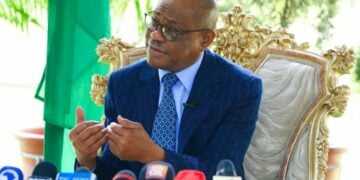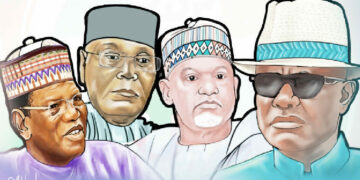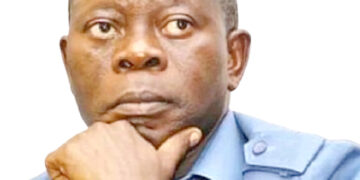It is true that the presence of the World Bank and International Monetary Fund (IMF) in developing countries dates back as early as the 1960s when many nations in the developing world, Africa in particular, became independent. And it is equally true that they have been with us since then, not minding the misgivings most Africans have continued to nurse about their existence and operations on the continent. But do they really care about us?
Not what they claim
While the World Bank prides itself on assisting the development of developing countries by providing technical and financial assistance, the IMF claims it is striving to enhance economic growth and stability by providing technical support and financing to member countries with economic difficulties.
The IMF has on several occasions claimed it is bent on assisting by offering advice to third world countries, especially those in supposed economic quagmire. But it is increasingly clear that the IMF is determined to derail the growth, development and well-being of developing countries.
As a matter of fact, the prevailing view among most residents and citizens of these countries is that both the IMF and the World Bank are undermining the growth and development of developing countries through painful and destructive advice which often retards growth and widen the inequality gap.
Fundamentally, years after their presence on the continent, it cannot be said with certainty that these institutions have effectively assisted Nigeria and other African countries navigate their complex economic challenges.
Worsening our woes
Clearly, it’s about time Nigeria and other third world countries looked IMF and its sister Bretton Woods organisations straight in the face and say: ‘to hell with your advice. We won’t take it. It never worked and never will because it was not meant to work for us in the first place’. It is crystal clear that the IMF and the World Bank are bent on compounding our woes. Pure and simple.
One move by the IMF which clearly demonstrates that as usual, it is bent on worsening the plight of most Nigerians is the recent admonition to the Nigerian government to completely phase out electricity subsidy because it does not reach those who need the government’s support. It offered the same advice when it urged the Nigerian government to suspend fuel subsidy and we all know where we are right now with the cost of premium motor spirit for example, even though the government is still providing some sort of intervention.
Against the backdrop of alarming poverty and high cost of living which have led to protests in different parts of the country, asking the government to phase out subsidy is not only mean but callous and a deliberate attempt to worsen the woes of most Nigerians.
And who could have imagined that this suggestion will come from an IMF that, in a recently released report, admitted that Nigeria is facing a worsening economic crisis.
It must be noted that the IMF, in a report titled, “IMF Executive Board Concludes Post Financing Assessment with Nigeria,” observed that stalled per-capita growth, poverty, and high food insecurity have exacerbated the ongoing cost-of-living crisis in Nigeria.
Yet it finds it fitting to enjoin the Nigerian government to phase out subsidy on electricity knowing fully well that electricity is required to power some small and medium enterprises which are run mostly by low-income Nigerians.
There is no contesting the fact that from 1944 when these Bretton Woods institutions were created to date, they have been driven by one desire and that is to impose the will of their paymasters on the developing world who are facing low level of living standards and development drawbacks, some of which were caused by these same paymasters.
These global economic institutions lack transparency in decision making, and are propelled by the drive to protect the interests and ideas of the western countries, thereby expanding their dominance across the world.
As a matter of fact, the World Bank and IMF have little to open to the world in terms of documents and information, though the World Bank has recently become more open to external scrutiny compared to the IMF.
In a 2013 article entitled, “Uncovering Bretton Woods: Conditional Transparency, the World Bank, and the International Monetary Fund”, David Gartner dwelt extensively on the opacity of World Bank and IMF but admitted that the World Bank has soft-pedalled.
“The World Bank’s new access to information policy, which took effect in 2010, declassified more than 15,500 documents within a year. It created a searchable database of 100,000 documents and provided for the simultaneous release of key board papers. It also created a new procedure that provided an appeals process for individuals seeking to secure documents that still remained confidential.
“The World Bank expanded its presumption of disclosure to all documents while retaining a limited number of exceptions. It also adopted several core principles to guide its policy including maximizing access, ensuring clear disclosure procedures, and guaranteeing the right to appeal,” Gartner noted.
IMF and the World Bank’s unsolicited advice to us have had and continue to have devastating impacts on the cost and standard of living. Most Nigerians remember the negative effect of the Structural Adjustment Programme (SAP). Without any fear of contradiction, the World Bank and IMF have done more harm than good to Nigeria and most African countries.
Subsidy is essential
Don’t get it twisted. We still need subsidy. If highly industrialized countries of Japan and the United States (US) among others had, at different times, supported their industries up to the stage where they become strong enough to withstand foreign companies, why should Nigeria not provide subsidy to its companies and the citizens?
How come the experts from the IMF and World Bank rarely advise these countries to open their markets and lift all kinds of trade and capital barriers to the rest of the world as they always ask African countries to do?
The US still offers subsidies in different areas and sectors, including agriculture, housing, export, oil, health care and automobiles. I cannot remember hearing the IMF ask the US to phase them out.
Rather than advocate for total phasing of subsidies because of the flawed claim that they do not benefit the people that need them the most, why not urge the government to go after those who are abusing these subsidies?
We cannot continue on this worn path of having these western financial institutions give African leaders the recipes that will further pauperise the citizens. It is time to ask the IMF and World Bank to hold their peace and stop disturbing us with jejune economic policies. We know they don’t really care about us!





